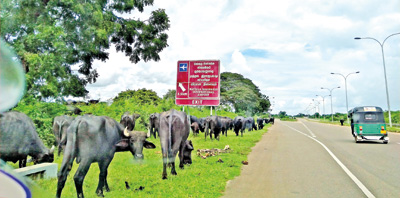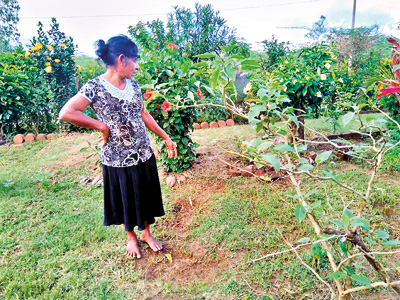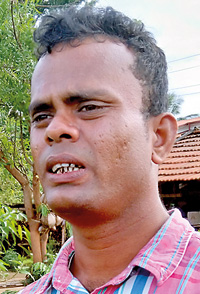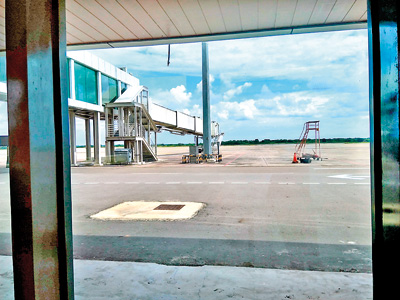News
Hambantota: From ‘promised’ land to fast becoming wasteland
Hambantota is a curious place. Its population is sparse and deeply agricultural. Its quaint, leafy villages and ancient Buddhist temples form the backbone of its farming communities. There are miles of scrub-land with no human habitation. But, suddenly—rising randomly out of the wilderness—are gleaming pieces of barely-used, expensive new infrastructure.

The road to Mattala airport: Where buffaloes roam
The China-funded cricket stadium in Sooriyawewa rarely sees a match played. A state-of-the-art conference centre has an electric fence to keep out elephants. A multi-storeyed district hospital, recently inaugurated, shows little sign of activity.
The international airport is, well, the international airport. FlyDubai stopped its single weekly scheduled flight earlier this year. The runway built to accommodate an A380 aircraft is used now for contingencies, like diversions in case of bad weather. There’s nothing on the flight information boards. Two aero bridges hang forlornly in the air while peacocks strut across the tarmac.
There are more cleaners here than visitors, except during school vacations when gaggles of people pay 100 rupees a head to take a look around.
A full 30km away from this forlorn edifice is the Chinese-built and run port. There’s more happening here now than before—but not significantly more, in terms of business diversity, than when Sri Lanka managed it alone. Roll-on/roll-off (RoRo) is still the main activity. Cars come, cars go. A small quantity is for local consumption. The larger share is transhipped.
It was the Mahinda Rajapaksa administration that, in 2012, ordered Sri Lankan automobile importers to reroute their business through Hambantota instead of Colombo. The Sirisena Government dragged its feet on a proposed Chinese industrial zone that would have nourished the port. And many a keen investor turned away, too, for lack of incentives.
The pace is painfully slow. Hambantota International Port Group (HIPG), the China-led joint venture company, has long wanted to start bunkering. This lucrative business is expected to inject some life into the sluggish port.In April, HIPG awarded the contract to China’s Sinopec for the oil tank farm. But it took months for the Ceylon Petroleum Corporation (CPC) to remove its own stocks from the tanks. They are now being cleaned before operations start, perhaps early next year.

Chandra points to the elephant footprints
Still, an industrial zone will be the main catalyst for growth and takes political determination to implement. It will mean carving out and acquiring ancestral lands from inhabitants, leading to another mass relocation as was carried out to build the port.
The results of that early resettlement drive are still being felt by those—man and animal—who were forced to shift. There are several giant depressions in the soft soil of 52-year-old Chandra’s garden in Waraya Gammanaya, or Port Village, which many families were railroaded, or enticed, into. These are elephant footprints.
The people of Waraya Gammanaya know a lot about elephants now. They lumber into their neighbourhoods most evenings, devouring plants if not chased away. Forty-two-year-old K G Harshanee’s grocery shop sells firecrackers for those who run out of their Government-issued elephant crackers or “alivedi”—two per day for anyone with a national identity card.
Chandra once lived on Target Road in Hambantota town. There were no elephants there, she said. Her husband’s siblings had homes nearby. As in the case of most other old settlements, parental properties were gradually carved up among children, leading to the formation of communities of close-knit extended families. The relocation ended that.
Lots were drawn for the new plots. Chandra’s husband now is the only brother in Waraya Gammanaya. These changes are keenly felt because in rural Hambantota, in sickness or in health, family was everything.

Nuwan Pradeep
Chandra received a 20-perch plot and less than a million in compensation. After moving here in 2016, she spent Rs 120,000 to raise the land because it was low-lying and couldn’t support a house. She bought water and electricity connections. The promised reimbursement never came; nor did the ten perches on which her husband could set up his small cycle repair business.
Now the shop is in a corner of that garden with its barely disguised elephant footprints. “There were more than these,” she said. “The animal came on the one night we fell asleep. My husband usually wakes up around 1.30 a.m. every day and walks around with a torch. But we all get tired sometimes, isn’t it?”
It broke through the fence, destroyed a thriving jak tree, pulled down a mango tree, uprooted five coconut plants and ate the banana plants. Most villagers no longer grown bananas because they attract elephants. They discuss buying electric fences for their homesteads but cannot afford it.
“You should have come here the day after our garden was ravaged,” she said.“My husband walked out, looked around and saw the damage. He said he had no use for this garden anymore and went to sleep. He was so distraught he didn’t clean it for days.”
The beasts don’t generally harm people, said her neighbour, 32-year-old Nuwan Pradeep. His own grandfather was killed in an elephant attack earlier this year but he was the only one. And he hadn’t really been in “his good senses”.
“These were elephant areas they settled us in, miss,” said Nuwan’s 26-year-old wife, Rasanjali Lakmini. “You can’t blame them. Their homeland was given to people. They have nowhere to go either.”
Nuwan shifted to Waraya Gammanaya in 2007. His family had grown cashew in Levayagoda on State property. So he also got an acre of cultivable land. But it’s in elephant territory, nowhere near his homestead and there is no water supply.

Internationl airport: Where engines rarely roar
“I don’t mind the elephants but there is no water,” he said. “Some people have their plots near the canal. Others are closer to the jungle, like me. And we have no transport to go there.” The Waraya Gammanaya has two buses that don’t operate after 5 pm.
When they relocated, the Government vowed that at least one member from each family would have a job in the new port. Nuwan knows nobody that benefited. “Forget a job, we don’t even get to sweep the port,” he said. “We are from Hambantota but they don’t let us in.”
The port does permit visitors to go to a lookout point after registering at the gate. This was suspended after the Easter bombings but restarted recently with the added condition that a security guard accompanies all outsiders.
Waraya Gammanaya is still not fully settled. There are half-built houses interspersed with overgrown plots and completed homesteads. The villagers say this is because some owners have sold their lands—“for small amounts”—to affluent people who hope they will rise in value when development spreads. But, because these areas remain partly inhabited and are part jungle, the wild animal problem is exacerbated.
“They dragged us down to the doldrums, miss,” said Nuwan. “Hambantota doesn’t have lazy people. They were growers. They will somehow grow something for consumption. The main issue is they are not suited to this 20-perch life. And whatever they now grow, the elephants take.”
The infrastructure hasn’t brought Hambantota the expected dividends. Mattala is also, for that matter, elephant—and other wild beast—territory. People are vaguely happy a port was built, heralding “development”. But they also know their economy hasn’t improved.
Chandra has the vague feeling that development is “good for the country” and are happy the children of Hambantota got to see a harbour bed before it was filled. But she struggles to explain how she benefited.
“A man that bought two lunch packets yesterday buys just one today,” said a worker at the New Sumedha Bakers and Tea Room. “And someone that handed over five rupees and told us to keep the change will wait now till I give back his two rupees.”
The roads have been built, of course, he said. Nowhere in the country is there a route network like in Hambantota. Overpasses, underpasses, elevated highways, neat intersections, just miles and miles of smooth, empty roadways. Automobiles are infrequent; cattle and buffalo, more numerous. And in certain areas, fences built to keep out elephants have noticeably been trampled down.
Residents also appreciated the centralisation of services in the sprawling new District Secretariat, with its electric elephant fence. And while disappointed with their lot, they express hope in the new dispensation in Colombo. The vote went predominantly to President Gotabaya Rajapaksa.
“The last Government did nothing,” said Rasanjali. “But we think maybe this Government will finish what it started and give people some relief.”
And, yes, there had once been grand plans for Hambantota that even included a financial district. Before the Rajapaksa administration lost, the area was promoted for investment among the business community. Don’t bring water-intensive industries, officials warned, but there was plenty of other opportunity. There had been a sort of special economic one planned for the airport with gaming centres and liberal laws to allow free flow of money.
The drive stopped abruptly when Sirisena and Ranil Wickremesinghe came to power. Infrastructure alone cannot perform miracles. Whether the old plans will be resurrected or new ones put in place remains to be seen. But there is now a sense of hope, of renewed beginnings.
“They are from here, aren’t they?” Chandra said. “From the South, like us. And those who took our lands from us surely can’t forget the beginnings. We have hope there will be more progress. But, mind, it’s not a family we want developed. It’s our country.”

